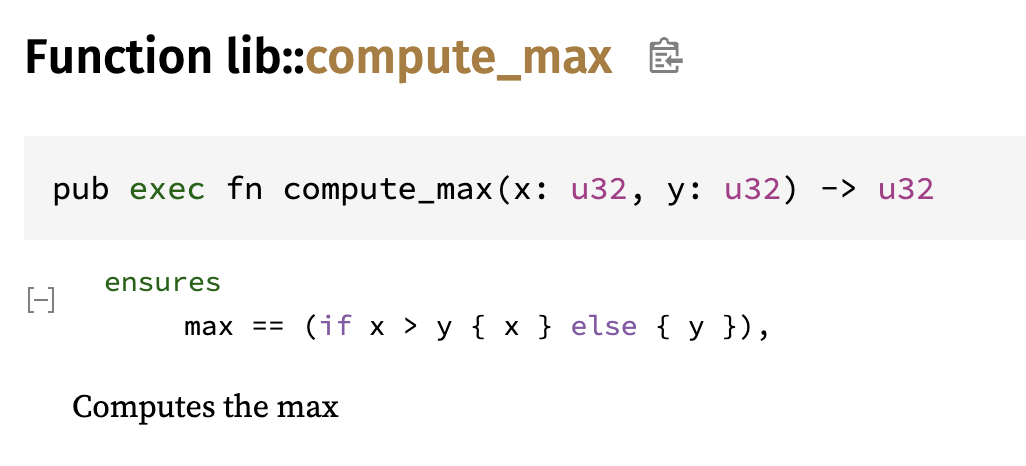Documentation with Rustdoc
Verus provides a tool to help make Verus specification look nice in rustdoc.
To do this, you first run rustdoc on a crate and then run an HTML postprocessor called
Verusdoc.
First, make sure verusdoc is built by running vargo build -p verusdoc in the
verus/source directory.
Unfortunately, we currently don’t have helpful tooling for running rustdoc with the
appropriate dependencies and flags, so you’ll need to set that up manually.
Here is an example:
VERUS=/path/to/verus/source
if [ `uname` == "Darwin" ]; then
DYN_LIB_EXT=dylib
elif [ `uname` == "Linux" ]; then
DYN_LIB_EXT=so
fi
# Run rustdoc.
# Note the VERUSDOC environment variable.
RUSTC_BOOTSTRAP=1 VERUSDOC=1 rustdoc \
--extern builtin=$VERUS/target-verus/debug/libbuiltin.rlib \
--extern builtin_macros=$VERUS/target-verus/debug/libbuiltin_macros.$DYN_LIB_EXT \
--extern state_machines_macros=$VERUS/target-verus/debug/libstate_machines_macros.$DYN_LIB_EXT \
--extern vstd=$VERUS/target-verus/debug/libvstd.rlib \
--edition=2021 \
--cfg verus_keep_ghost \
--cfg verus_keep_ghost_body \
--cfg 'feature="std"' \
--cfg 'feature="alloc"' \
'-Zcrate-attr=feature(register_tool)' \
'-Zcrate-attr=register_tool(verus)' \
'-Zcrate-attr=register_tool(verifier)' \
'-Zcrate-attr=register_tool(verusfmt)' \
--crate-type=lib \
./lib.rs
# Run the post-processor.
$VERUS/target/debug/verusdoc
If you run it with a file lib.rs like this:
#![allow(unused_imports)]
use builtin::*;
use builtin_macros::*;
use vstd::prelude::*;
verus!{
/// Computes the max
pub fn compute_max(x: u32, y: u32) -> (max: u32)
ensures max == (if x > y { x } else { y }),
{
if x < y {
y
} else {
x
}
}
}
It will generate rustdoc that looks like this:
